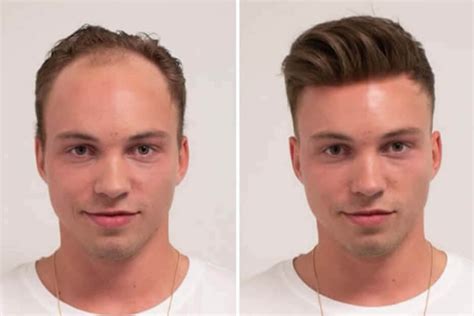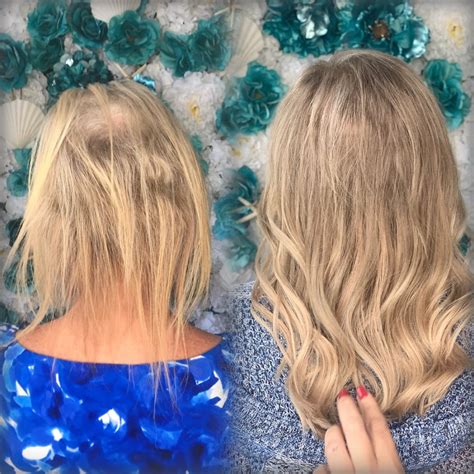Extensions and Thinning Hair: What’s the Truth?
Hair extensions are a popular way to add length, volume, and color to your hair. However, there is a common concern that hair extensions can damage your natural hair and cause it to thin.

Is this concern valid? Let’s take a closer look at the evidence.
Extensions & Thinning Hair: The Evidence
There is some evidence to suggest that hair extensions can cause hair loss. A study published in the Journal of Cosmetic Dermatology found that women who wore hair extensions for more than six months were more likely to experience hair loss than women who did not wear hair extensions.
However, it is important to note that this study was small and did not control for other factors that could have contributed to hair loss, such as genetics, diet, and lifestyle.
More research is needed to determine whether or not hair extensions actually cause hair loss. However, it is clear that hair extensions can put stress on your natural hair, which could lead to breakage and thinning.
Extensions & Thinning Hair: What You Can Do
If you are concerned about hair extensions thinning your hair, there are a few things you can do to minimize the risk:
Choose the right type of extensions. Some types of hair extensions are more likely to cause damage than others. For example, glue-in extensions and sew-in extensions can put more stress on your natural hair than clip-in extensions or tape-in extensions.
Get your extensions installed by a professional. A professional stylist will be able to properly install your extensions and minimize the risk of damage.
Take breaks from wearing extensions. It is a good idea to take breaks from wearing extensions every few months to give your natural hair a chance to rest.
Use hair care products that are designed for extensions. These products will help to keep your extensions looking healthy and prevent them from damaging your natural hair.
Extensions & Thinning Hair: The Bottom Line
The bottom line is that there is some evidence to suggest that hair extensions can cause hair loss. However, more research is needed to determine whether or not this is actually the case. If you are concerned about hair extensions thinning your hair, there are a few things you can do to minimize the risk.
Additional Tips for Preventing Hair Loss from Extensions:
Use a wide-toothed comb to brush your hair. This will help to prevent tangles and breakage.
Avoid brushing your hair when it is wet. Wet hair is more fragile and prone to breakage.
Gently detangle your hair with your fingers before brushing it. This will help to prevent breakage.
Avoid using heat styling tools on your hair. Heat can damage your hair and make it more prone to breakage.
Eat a healthy diet that includes plenty of fruits, vegetables, and whole grains. A healthy diet will help to keep your hair healthy and strong.
Get regular exercise. Exercise can help to improve blood circulation to your scalp, which can promote hair growth.
Manage stress. Stress can lead to hair loss. Find healthy ways to manage stress, such as exercise, yoga, or meditation.
If you are experiencing hair loss, see a doctor. There may be an underlying medical condition that is causing your hair loss.
Conclusion:
Hair extensions can be a great way to add length, volume, and color to your hair. However, it is important to be aware of the potential risks of hair loss before getting extensions. By following the tips above, you can minimize the risk of hair loss and enjoy your new extensions for years to come.
Table 1: Types of Hair Extensions
| Type of Extension | How It Is Attached | Pros | Cons |
|---|---|---|---|
| Clip-in extensions | Clips | Easy to apply and remove | Can be uncomfortable to wear |
| Tape-in extensions | Tape | Less visible than clip-in extensions | Can damage hair if not applied properly |
| Glue-in extensions | Glue | Long-lasting | Can damage hair if not applied properly |
| Sew-in extensions | Thread | Most secure type of extension | Can be time-consuming and expensive to apply |
Table 2: Tips for Preventing Hair Loss from Extensions
| Tip | How It Helps |
|---|---|
| Choose the right type of extensions | Some types of extensions are more likely to cause damage than others. |
| Get your extensions installed by a professional | A professional stylist will be able to properly install your extensions and minimize the risk of damage. |
| Take breaks from wearing extensions | It is a good idea to take breaks from wearing extensions every few months to give your natural hair a chance to rest. |
| Use hair care products that are designed for extensions | These products will help to keep your extensions looking healthy and prevent them from damaging your natural hair. |
Table 3: Effective Strategies for Dealing with Thinning Hair
| Strategy | How It Helps |
|---|---|
| Use hair loss prevention products | There are a number of products on the market that can help to prevent hair loss, such as minoxidil and finasteride. |
| Get regular haircuts | Regular haircuts can help to remove split ends and damaged hair, which can make your hair look thinner. |
| Eat a healthy diet | A healthy diet that includes plenty of fruits, vegetables, and whole grains can help to keep your hair healthy and strong. |
| Get regular exercise | Exercise can help to improve blood circulation to your scalp, which can promote hair growth. |
Table 4: Pros and Cons of Hair Extensions
| Pros | Cons |
|---|---|
| Can add length, volume, and color to your hair | Can be expensive |
| Can be used to cover up hair loss | Can damage your natural hair |
| Can be a temporary or permanent solution | Can be uncomfortable to wear |
